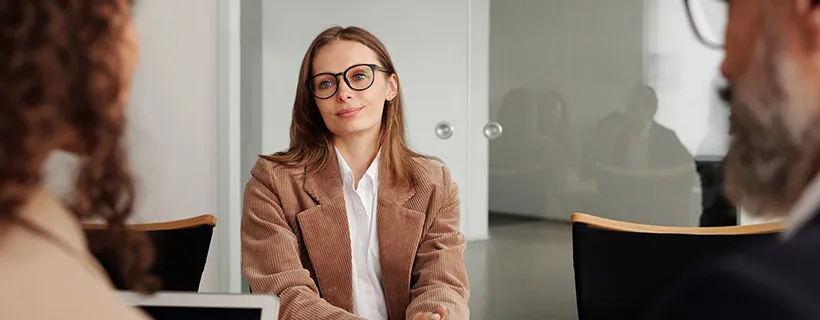How to conduct a successful job interview

As a manager of a growing team, interviewing other people properly is essential. For the most part, a good interview technique will help you to put the candidate at ease, get the very best out of them and ultimately make a fair and educated assessment of their suitability.
However, this skill is too often overlooked and not given the attention it deserves. Moreover, many people forget that an interview is a two-way process, and that you too are being assessed by the candidate.
To help you run a successful interview, we suggest you:
Read the candidate’s CV before the interview
Schedule half an hour before each interview to familiarise yourself with the candidate you are about to see. Review any projects and examples of their work which are of interest, and take a look at their LinkedIn profile. Doing so will help you feel prepared, and allow you to start building a rapport with the candidate.
Don’t be too quick to judge
During your preparation for the interview, be mindful not to form any preconceived ideas or opinions about the candidate’s suitability for the role. Perhaps, after reading their CV, you are concerned about a possible skills gap or career decision that they made. While these concerns may well be justified, don’t rule any candidate out or make any snap judgements before or while interviewing them. Keep an open mind and give the candidate a fair chance.
Be timely
Turning up late to the interview is poor form and will only serve to worsen the candidate’s nerves. Likewise, hurrying the candidate out of the door once the interview has ended because you have another meeting to attend is discourteous, and can damage your reputation as an employer.
Try to make a concerted effort to clear at least 30 minutes either side of the interview. Treat the candidate and the entire hiring process as your priority, because at this point in time, it is.
Put the candidate at ease from the start
Greet the candidate warmly. Smile, shake their hand, and make conversation as you walk to the interview room. Make sure you are in a private area, and if there is no space in your office, meet at a quiet café near your work.
Avoid a robotic introduction
When interviewing a candidate, always start by giving a short introduction to yourself, the company, as well as the vacancy you are hiring for. This may sound like a simple task, but it can be surprisingly easy to slip up here.
Avoid giving an unstructured, generic introduction, by simply rattling off information in the job description and company website. Instead bring the opportunity to life for the candidate, and give them an insight that they wouldn’t have been able to find during their preparation for the interview. Explain how the role has evolved, why it is important to the company’s purpose and objectives, and what a typical working day might look like. Talk about the company culture, the team dynamic, and your favourite aspects of working here. Ultimately, make the candidate feel excited about the opportunity and able to picture themselves in the role.
Work on your questioning technique
When preparing interview questions, most hiring managers cover off all the necessary technical skills required to perform the role successfully.
Don’t forget to also cover:
Soft skills: Some interviewers may neglect to ask those questions which will reveal more about the candidate’s soft skills, such as being well organised, the ability to build rapport with stakeholders or good listening skills. These are traits that can’t always be taught but are essential to the role or business culture. So identify the necessary soft skills required and ask questions designed to reveal their abilities in these areas. For example, “Tell me of a time you built a lucrative relationship with a client. How did you do it?”
Cultural fit: Many new hires don’t work out simply because they don’t suit the company culture in some way or another. Ask questions that will help you determine how well the candidate would fit in with the team and company culture. For example, if they need to be team spirited to fit in with your culture, you could ask, “How would you describe your style of working?” or “Can you give me an example of a time when you worked well in a team?”
Ask about their ambitions: This new hire is an investment. More than likely you will want her or him to remain with your organisation long-term and progress their career internally. Therefore ask questions about the candidate’s career ambitions, areas in which they would like to develop, and their longer term goals.
Avoid closed questions: The candidate should be doing most of the talking during the question and answer session of the interview, so avoid asking closed questions which only produce a simple yes or no answer. For instance, ask the candidate “Why do you want this job?” as opposed to “Do you want this job?” This should prompt more detailed and relevant responses. Once the candidate has finished answering, don’t jump straight to the next question either. Instead, engage with their answer and if necessary, ask them to elaborate.
Would the candidate like to ask you any questions?
Don’t get so preoccupied with getting your own questions right that you forget to prepare yourself for those questions which the candidate might ask you. For example, the candidate may well ask you how the role came about. Whatever you do, do not say anything negative about the predecessor for this role. Even if they left on bad terms, there’s no need to share this information.
The candidate may also ask you about some of the challenges you face as a business or within your team. After all, challenges at work are inevitable. But again, this type of question still demands a positive and professional answer. Yes, you can talk about the trials you are sometimes up against, but place the emphasis on how you work to overcome them.
Tips for conducting a remote job interview
As in a face-to-face interview, use your body language to show genuine interest in the candidate’s answers. Before asking each new question, take a slight pause to ensure the candidate has finished talking.
Confirm the next steps
Search for candidates
Recruitment information
How you can implement skills-based hiring
How to write a position description
Becoming an employer of choice
How to conduct a successful job interview
Using a recruitment consultancy
Bridging the skills gap
8 questions candidates will ask you
What is an Employee Value Proposition?
Retention strategies to retain top talent

